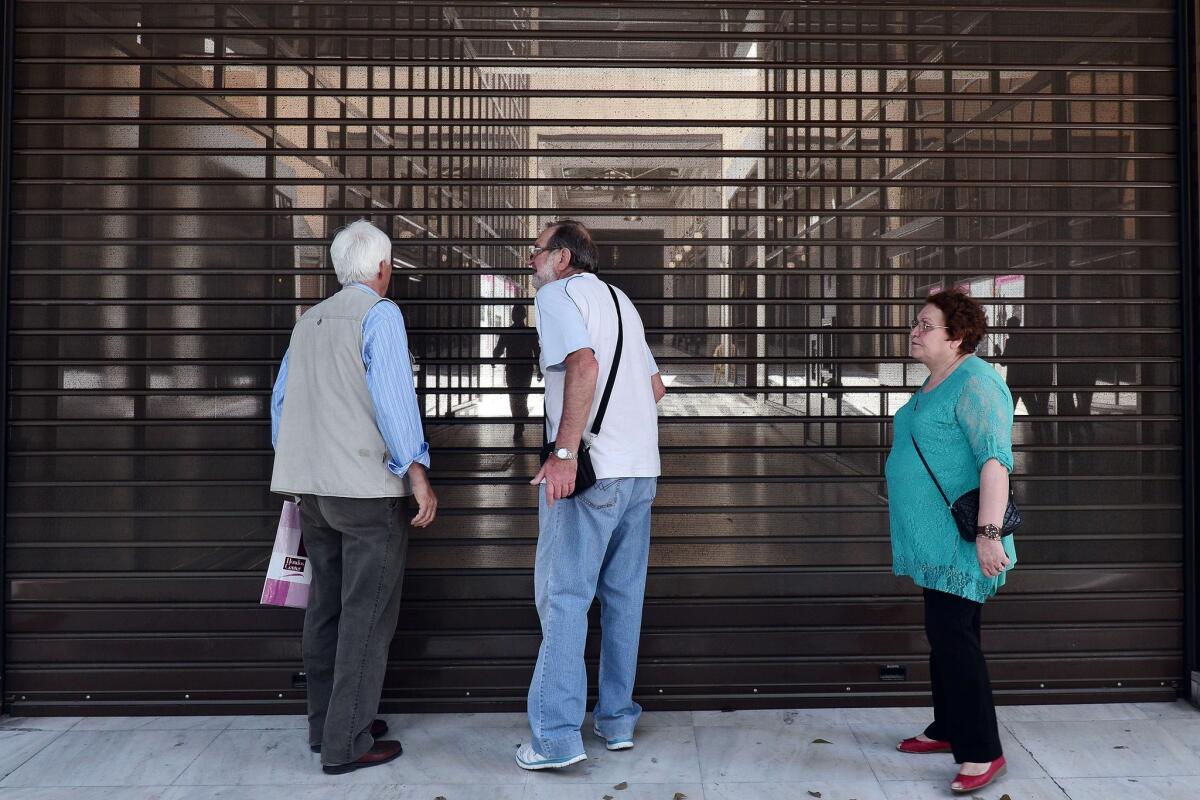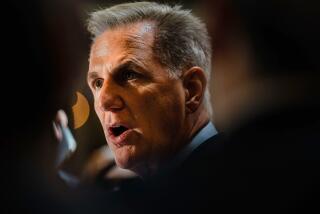Europe to Greece: Get back to the bargaining table before it’s too late

Pensioners stand behind shutters of the Alpha Bank headquarters in central Athens on June 29.
- Share via
Reporting from Athens — Leaders around Europe appealed to Greece on Monday to return to the bargaining table over a bailout agreement as stock markets dipped and some Greeks began stocking up on supplies, hoarding cash and hunkering down for a week of political and financial uncertainty.
A parade of European officials also warned Greece that its referendum on bailout terms scheduled for this weekend was tantamount to a referendum on whether the country wanted to stay in the Eurozone. The president of the European Commission, Jean-Claude Juncker, told Greeks not to “commit suicide” by voting no.
The Greek government remained adamant that blame for the failed bailout negotiations lay squarely with its partners in the 19-nation Eurozone, the euro currency club. To prevent more cash from being drained from Greece’s floundering financial system, a weeklong bank closure began Monday, and residents were limited to $66 in cash withdrawals from ATMs a day.
Europe’s major stock markets closed lower on the developments in Greece. Borrowing costs for other Southern European nations considered economically vulnerable, such as Italy, rose slightly but were far short of the level that would suggest a rapid collapse of confidence in the Eurozone as a whole.
Eurozone officials insist that their economies are now much better able to withstand the shock of a potential Greek exit from the common currency, although no one knows for sure what would actually happen and no one wants the situation to reach that point.
Without a deal, Greece’s current bailout package is set to expire Tuesday, and Athens is expected to miss a payment it owes the International Monetary Fund.
In Greece, retirees lined up at some banks in hopes they would open so that they could claim pension payments. Some news outlets also said that shoppers were making a run on staples in a few supermarkets and motorists were queuing at gas stations to fill up their tanks, fearful of a fuel shortage even though Greek officials have said that supplies are ample.
Greeks have already been beaten down by five years of harsh austerity measures that have seen the economy contract by 25%. Many had already withdrawn some of their savings from banks before the government-imposed closure Monday; the Greek banking system has lost billions of euros in the last several weeks.
On Monday evening, thousands of pro-government protesters converged on Athens’ main square, in front of the Parliament. Demonstrators hoisted signs bearing the word “oxi,” or “no,” siding with the ruling left-wing Syriza party’s decision to campaign against the bailout terms on offer. The government contends that the proposals will hurt the poor and elderly disproportionately.
Despite the crisis gripping the nation, the mood in the crowd was defiant.
“We are not here for ourselves but for” our children, said travel photographer Iraklis Milas, 40, whose 4-year-old son sat on his shoulders. “We may have been through hell these last years and during what should be the most productive years of our lives, and maybe we can still take more. But if the proposal is passed, it will condemn our kids for another 30 or 40 years.”
A rally in support of the European Union is scheduled for Tuesday.
In Brussels, in a remarkable speech that was by turns entreating and hectoring, Juncker said he would not give up on trying to keep Greece in the Eurozone and did not want to see “Plato play in the second division.”
At the same time, he essentially accused the government of Greek Prime Minister Alexis Tsipras of lying about the bailout proposals and of negotiating in bad faith. Juncker said that the terms on offer were generous and that it was the Greek side that abandoned the bargaining table.
The walkout “happened at the worst moment. We really moved mountains until the very last minute when Greek authorities closed the door,” Juncker said. “All elements of a credible and comprehensive deal were on the table.”
“This is not a stupid austerity package,” Juncker said, but he acknowledged that “some of the measures, of course, will hurt in the near term.”
German Chancellor Angela Merkel, the most powerful of the Eurozone leaders, called for a spirit of compromise and repeated her warning throughout the long-running euro debt crisis that “if the euro fails, Europe fails.”
Merkel said Athens had a right to call a referendum, even though that decision stunned European leaders who had thought they could keep negotiating with Tsipras’ government. But Merkel said the other 18 Eurozone nations also had a right to respond to that act by deciding to not extend Greece’s current bailout past its Tuesday expiration.
French President Francois Hollande said he hoped negotiations with Greece could resume.
“An agreement remains possible,” he said, but added that if Greece turned its back on the Eurozone, France would carry on. “Today the French economy is stronger than four years ago and has nothing to fear.”
Follow @HenryHChu on Twitter for coverage of Europe
Times staff writer Chu reported from London and special correspondent Zafiropoulos from Athens.
More to Read
Sign up for Essential California
The most important California stories and recommendations in your inbox every morning.
You may occasionally receive promotional content from the Los Angeles Times.














